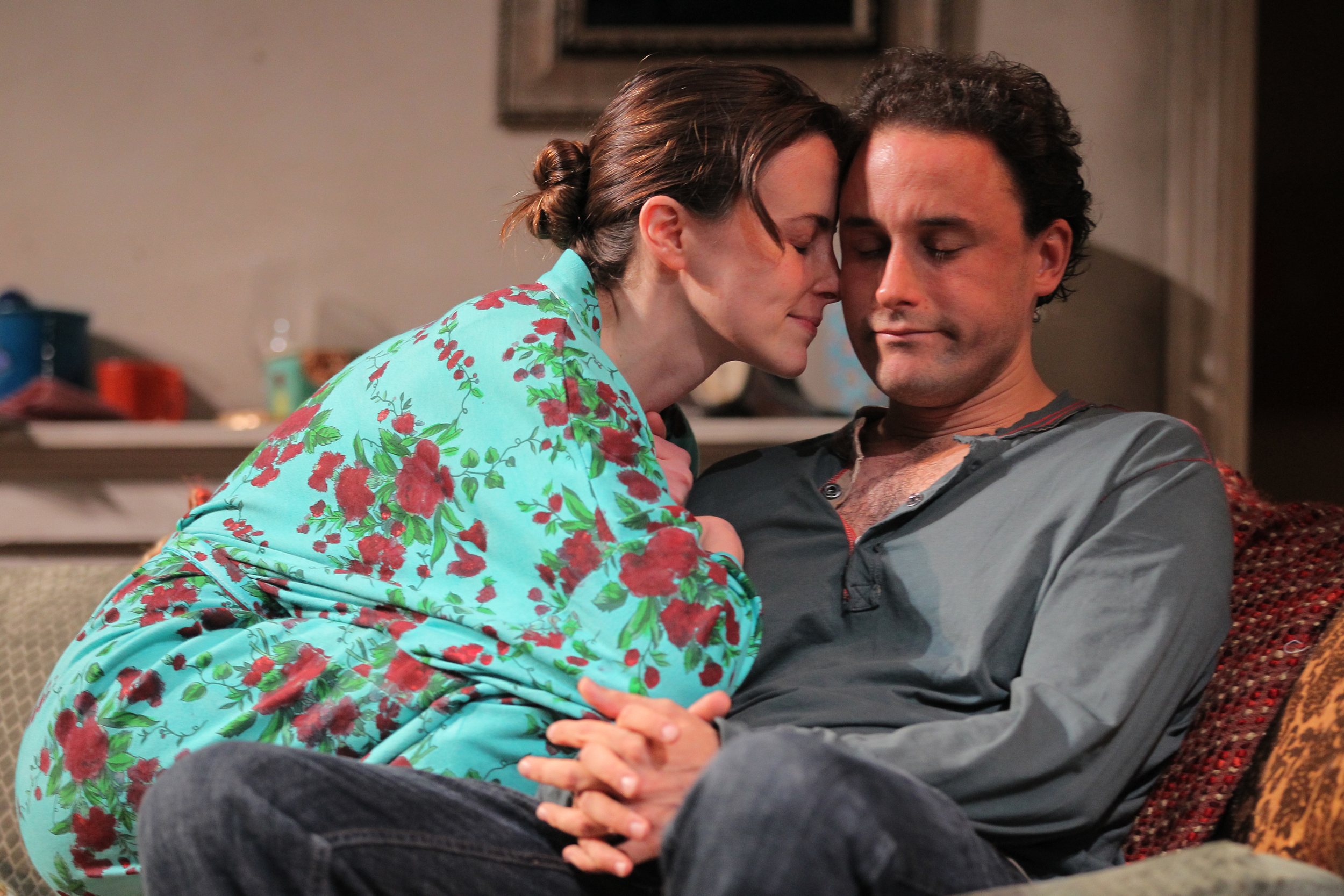Watching Amy Herzog’s Belleville is an exercise in having your worst fears about people confirmed. The play offers a fascinating interplay between two narrative arcs: the spiralling down of what might be perceived as a romantic comedy, dressed up with dramatic overtones, and the raising of sinister tensions that, like the denouement of an Ibsen play, lay waste to the comfortable world we began with. The second play of the Yale Repertory Theatre’s 2011-12 Season and a World Premiere, Belleville is a triumph of slowburn technique. It’s the kind of play that, with only four characters, one set and no intermission, provides all its thrills and brilliance by simply placing its characters before us and letting us see them squirm and prevaricate and plead and joke and couple and coo and become gradually, relentlessly unhinged and desperate. The effect is exhilerating, an entertaining skirting of the abyss where the pursuit of normality turns deadly.
Disrupted from our failsafe positions, the play asks, how do we act? In human relations, we might say, rationality is only skin deep, the rest is pathology.
Abby (Maria Dizzia), a somewhat spoiled daddy’s girl, is going to be away from home at Christmas for the first time. That might not be such a big deal, but her sister’s about to have a baby and their mother died not too long ago. She’s in Paris—the “diverse” (though she’s self-conscious about using the word) section from which the play takes its title—offering wifely support to her new husband Zack (Greg Keller), a recent Johns Hopkins Med School grad doing important work on AIDS. Abby is still at the stage where she proudly shows off the wedding album (“I was really happy that day”) and attempts to put a good face on the little gaffes of cohabitation—like walking in on Zack masturbating to porn when he should be at work.
Herzog establishes early a grasp of how newlyweds, away from everyone they know and barely sure they know each other in this new context, have much to grapple with in every exchange—over what to wear, and where to go, and how to placate Abby’s father’s expectations and how to meet the demands of Zack’s job while maintaining a fun, lovers-abroad feeling. Fortunately, the landlord Alioune (Gilbert Owuor) is a personable guy willing to eat Christmas cookies though a Muslim, look at Abby’s photo album, and share a companionable bowl with Zack. Then again, friendship in such cases only goes so far when the rent’s overdue.
Pull on a strand and watch the unfinished tapestry of this young couple’s efforts at married life come unraveled. Anne Kauffman’s production is strong in the subtle touches that keep us guessing at what’s behind certain actions and comments, and in providing the punch of dramatic moments that shatter the congenial tone. The interplay and body language between the two principle characters is particularly effective when they grope for an intimacy they’re having a hard time finding.
Maria Dizzia’s role is complex: Abby is girlish, brittle, vulnerable, wounding, hysterical by turns. A spoiled spoiler but also a centerpiece, the raison d’être of Zack’s world, she is the engine that makes Belleville run. Herzog vents a bit on Abby’s inadequacies, but she also extends understanding to her when necessary.
As Zack, Greg Keller has the most difficult role. We have to like him, but not too much. He plays the ingratiating side of such a character perfectly—we’ve all met someone like him. And when things take a turn for the worse, we realize, with a growing chill and unease, that we truly don’t know what he’s capable of.
As landlord Alioune, Gilbert Owuor seems a bit more wooden than is necessary; understandably aloof, a landlord put in the position of being a friend, his character as played is hard to read. Herzog shows us that male bonding is often built upon deceiving women together, but Owuor could give us a bit more interest in Alioune as Zack’s foil.
As Alioune’s wife Amina, Pascale Armand makes the most of her three brief scenes. Her role is key in showing us a major difference between Abby and Zack and Alioune and Amina. We could reduce it to a cultural difference—the role of the “traditional wife” versus the contemporary version Abby manifests—but more to the point is the strength of character—demanding as it is—of Amina, a woman who, we grasp immediately, has no illusions and little patience for the self-delusions of others. Her presence is an immediate reality check.
A sprawling space with certain important areas we can’t see, the set by Julia C. Lee is an apartment just a bit seedy that, with its interesting ceiling slopes and skylights, its attractive windows and comfortable, lived-in look, presents the perfect locale for a slumming up-and-coming couple. And it is a repeated pleasure watching what different times of day, via Nina Hyun Seung Lee’s lighting, do with the place.
Commissioned by Yale Rep and developed through the Yale Center for New Theatre, Belleville is Amy Herzog’s Yale Rep debut. New Haven is fortunate to get in on the early work of this talented playwright, and she's at work on a newly commissioned play for the Rep.
A convincing study of the uncertainties beneath the identities we construct, Belleville is certainly worth a visit.
Belleville Written by Amy Herzog Directed by Anne Kauffman Yale Repertory Theatre October 21 to November 12, 2011



